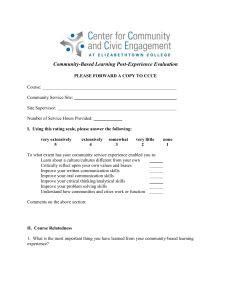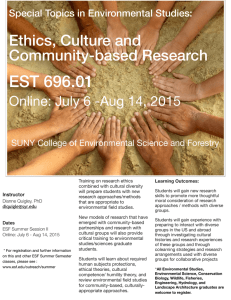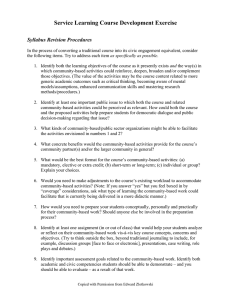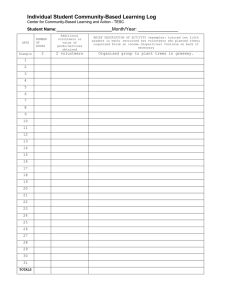CU Engage is pleased to announce this RFP that will... for Faculty Fellows in Community-Based Learning. This program provides resources
advertisement
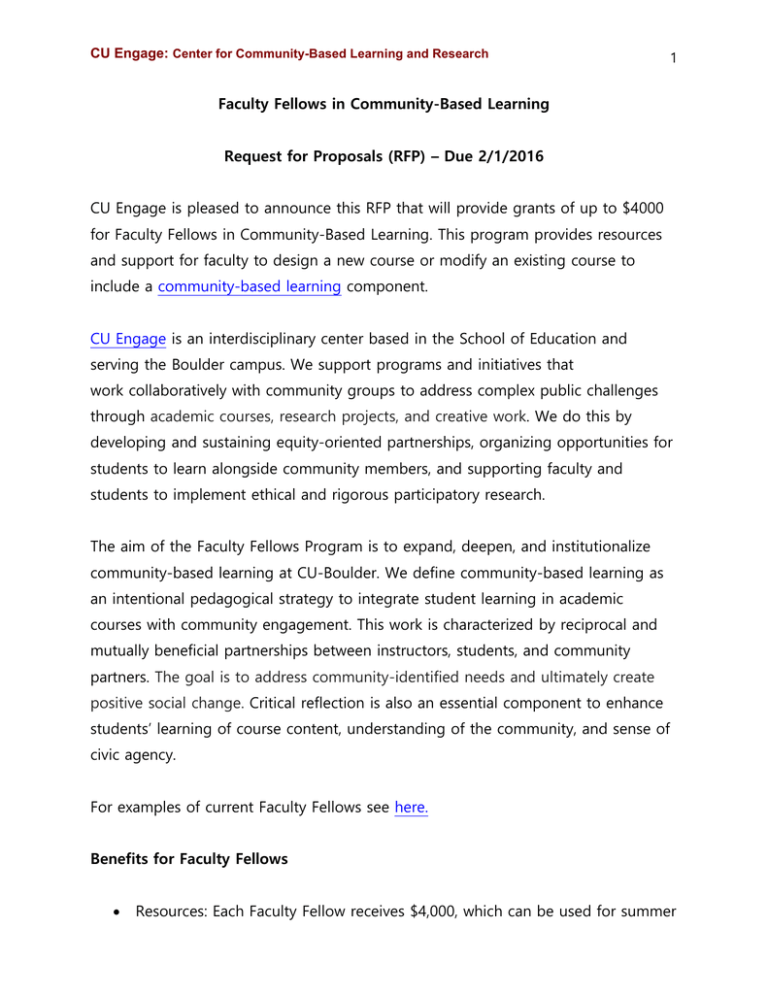
CU Engage: Center for Community-Based Learning and Research 1 Faculty Fellows in Community-Based Learning Request for Proposals (RFP) – Due 2/1/2016 CU Engage is pleased to announce this RFP that will provide grants of up to $4000 for Faculty Fellows in Community-Based Learning. This program provides resources and support for faculty to design a new course or modify an existing course to include a community-based learning component. CU Engage is an interdisciplinary center based in the School of Education and serving the Boulder campus. We support programs and initiatives that work collaboratively with community groups to address complex public challenges through academic courses, research projects, and creative work. We do this by developing and sustaining equity-oriented partnerships, organizing opportunities for students to learn alongside community members, and supporting faculty and students to implement ethical and rigorous participatory research. The aim of the Faculty Fellows Program is to expand, deepen, and institutionalize community-based learning at CU-Boulder. We define community-based learning as an intentional pedagogical strategy to integrate student learning in academic courses with community engagement. This work is characterized by reciprocal and mutually beneficial partnerships between instructors, students, and community partners. The goal is to address community-identified needs and ultimately create positive social change. Critical reflection is also an essential component to enhance students’ learning of course content, understanding of the community, and sense of civic agency. For examples of current Faculty Fellows see here. Benefits for Faculty Fellows Resources: Each Faculty Fellow receives $4,000, which can be used for summer CU Engage: Center for Community-Based Learning and Research 2 salary, teaching/research materials, or other appropriate uses, as determined by applicant and approved by CU Engage Selection Committee, Chair, and Dean. Professional development: Fellows participate in a Community-Based Learning Institute that provides a dedicated process and structure to develop syllabi, assignments, and other tools needed to successfully implement a communitybased learning course. Membership in professional learning community: Exchange ideas and intellectual support with other Fellows at the Institute and beyond. Faculty Fellow Commitments Participate in Course Development Institute during 2016 Maymester. The Institute will consist of three half-day seminars (Monday May 9, 16, 23). Fellows are expected to complete readings on community-based pedagogy in advance of the Institute. Meet with CU Engage Associate Director, Dr. Roudy Hildreth, in advance of the Institute to discuss goals and interests. This meeting will be the basis for identifying discipline specific resources, materials, and model courses. Design a new course or significantly modify an existing course so that it uses community-based learning as a central pedagogy. Teach the community-based learning course as soon as feasible (within one year for an existing course and within two years for a new course), with the expectation that it will be taught for at least two iterations. Participate in assessing course outcomes for students and/or community partners. Give a presentation about the course to department after teaching the course. Expectations We expect that grant recipients will serve as advocates and resources for community-based learning in their home department and provide CU Engage: Center for Community-Based Learning and Research 3 consultation on community-based learning to colleagues across the university. Grantees may be asked to present their experiences to or serve as mentors for faculty interested in community based-learning fellows (we are mindful of time commitments). Application checklist Grant proposal Letter of support from community partner Faculty Fellows Grant Agreement Form, signed by applicant and Chair or Dean Grant Proposal Requirements Length: Five double-spaced pages maximum, not including letter of support, agreement form, or syllabi. 1. Applicant and Course Information a. Applicant name and contact information b. Title, course number (existing courses), faculty/instructor(s), contact info. c. How often is / will the course be taught? d. Expected enrollment? e. Does or will the course fulfill a major, minor, or general education requirement? 2. Course Goals and Strategies a. What are the learning objectives of the proposed CBL course? b. What is the academic or disciplinary content of the course? c. What are the expected activities for students in their community placement? d. How do the community-based components connect with the academic content of the course? Please describe structured reflection assignments/activities to facilitate connection of the service activity with CU Engage: Center for Community-Based Learning and Research 4 academic concepts and to encourage critical thinking. e. Optional appendix: Attach the course syllabus for existing courses or topic outline for new courses. 3. Community Focus and Reciprocity a. Identify and describe the community partner(s). (If you do not already have a community partner, and would like help connecting with existing initiatives or partnerships, please email cuengage@colorado.edu for information about existing initiatives that your course might join). b. Describe how you will plan in a collaborative way with community partners and how the CBL course will support the priorities and stated needs of community partners. c. Describe whether and how your course works with under-served communities. d. Describe the anticipated impact on the community that results from the partnership between your CBL course and community organization(s). 4. Assessment a. Please be prepared to provide a short description of a planned assessment strategy. This strategy should address the following details: i. How will you understand if your course has achieved its goals? Include information about specific goals and how you plan to measure them (e.g. what tools/instruments/rubrics will you use?). ii. How are students, faculty, and/or the community partner involved in the assessment? (Do they supply data, or participate in instrumentation?) 5. Sustainability a. Describe plans for sustainability and departmental support for offering the community-based learning course on a continuing basis. This could include your plan to put this course in regular rotation, allow it to meet a requirement for major, minor, or certificate, or recruit multiple faculty CU Engage: Center for Community-Based Learning and Research 5 members who will teach the course. 6. Budget Requirements. Please provide a budget showing how you will use the $4000. a. Funds may be used for: i. Summer compensation of faculty/staff time for course development; ii. Teaching/research materials; iii. Other appropriate uses, such as resources for community partners or support for a student assistant. b. Details of the budget should be provided in a budget narrative explaining how projected expenses relate to the community-based component of the course. Letter of Support Requirements 1. The letter of support from your community partner should document their understanding of the project, how you and the partner will co-develop the project, and how the project will address the organization’s needs, Eligibility and Selection Process: The CU Engage Faculty Fellows Program is open to all CU Boulder faculty members (instructors, lecturers, and tenured and tenure-track faculty) from any department. Priority will be given to proposals that are sustainable and integrated into departmental or general education curricula. We especially encourage teams of faculty to apply in cases where two faculty alternate teaching the same course, where there is a sequence of courses as part of a degree program, or faculty from different disciplines co-teach the same course. Six Faculty Fellows will be selected. If instructors are applying as a team, each will receive the full grant and count towards the six total grants. Deadline for proposal and supporting documents: Monday, February 1, 2016. CU Engage: Center for Community-Based Learning and Research Please submit your proposal via CU Boulder’s Outreach and Community Engagement Awards website: http://outreachawards.colorado.edu/. (This submission portal will be available starting 1/4/2016). Questions about the RFP? Email: roudy.hildreth@colorado.edu CU Engage phone: 303-492-7719 6 CU Engage: Center for Community-Based Learning and Research 7 CU ENGAGE FACULTY FELLOWS FOR COMMUNITY-BASED LEARNING GRANT AGREEMENT I, __________________________, agree to maintain all of the commitments below for the CU Engage Faculty Fellows for Community-Based Learning Grant program: ● Participate in Community-Based Learning Institute during 2016 May term. Participants are expected to complete readings and meet with CU Engage Associate Director prior to the Institute. ● Design a new course or significantly modify an existing course so that it uses community-based learning as a central pedagogy. ● Implement this community-based learning course as soon as possible (within one year for an existing course and within two years for a new course). This course will be taught for a minimum of two iterations. ● Assess student learning in the community-based learning course. ● Give presentation on the course to department or academic unit after teaching the course. I understand that that my participation in all aspects of this program is required to receive the $4,000 course transformation grant. Faculty signature __________________________________________ Date ______________ Chair and Dean Support I will approve and support ______________________’s application for this grant. I will also work to sustain this community-based learning course as an ongoing, regular course offering in my department’s curriculum. I understand that successful applicants will receive a $4,000 grant to support course CU Engage: Center for Community-Based Learning and Research development. Funds can be used for summer salary, teaching/research materials, or other appropriate uses, as determined by applicant and approved by CU Engage Selection Committee and the departmental Chair or Dean. Department Chair / Dean: Name _________________________________ Department/School __________________ Signature ____________________________________________ Date ______________ 8
